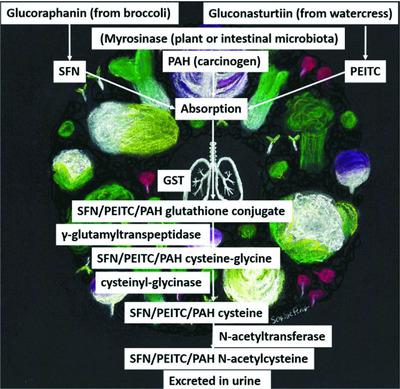当前位置:
X-MOL 学术
›
Mol. Nutr. Food Res.
›
论文详情
Our official English website, www.x-mol.net, welcomes your
feedback! (Note: you will need to create a separate account there.)
The Role of Cruciferous Vegetables and Isothiocyanates for Lung Cancer Prevention: Current Status, Challenges, and Future Research Directions
Molecular Nutrition & Food Research ( IF 4.5 ) Pub Date : 2018-06-12 , DOI: 10.1002/mnfr.201700936 Zhenzhen Zhang 1 , Raymond Bergan 2 , Jackilen Shannon 1 , Christopher G. Slatore 3, 4 , Gerd Bobe 5 , Yumie Takata 6
Molecular Nutrition & Food Research ( IF 4.5 ) Pub Date : 2018-06-12 , DOI: 10.1002/mnfr.201700936 Zhenzhen Zhang 1 , Raymond Bergan 2 , Jackilen Shannon 1 , Christopher G. Slatore 3, 4 , Gerd Bobe 5 , Yumie Takata 6
Affiliation

|
Lung cancer remains a leading cause of cancer‐related deaths in the United States. Although smoking and air pollution exposure are primary risk factors of lung cancer, diet has also been reported to contribute to lung cancer risk. Cruciferous vegetables contain many bioactive compounds that alter the detoxification process of air‐borne carcinogenic compounds and, thereby, may decrease lung cancer risk. In the meta‐analysis of 31 observational studies, cruciferous vegetable intake is inversely associated with lung cancer risk (summary odds ratio/relative risk = 0.81 and 95% confidence interval = 0.74–0.89 for comparing the highest with lowest intake categories). More observational studies need to measure urinary isothiocyanate (ITC) concentrations and investigate their association with lung cancer risk in populations with relatively high intake of cruciferous vegetables. Current evidence is limited to two phase 2 clinical trials with incomplete reporting. Hence, more short‐term clinical phase 2 trials need to examine effects of various amounts and types of cruciferous vegetables on biomarkers of risk and efficacy before a large phase 3 trial can be conducted to assess effects upon lung cancer risk. This would help further elucidate whether the inverse association observed with self‐reported cruciferous vegetable intake is indeed due to ITC content or other bioactive compounds.
中文翻译:

十字花科蔬菜和异硫氰酸盐在预防肺癌中的作用:现状,挑战和未来研究方向
在美国,肺癌仍然是与癌症相关的死亡的主要原因。尽管吸烟和空气污染暴露是肺癌的主要危险因素,但据报道,饮食也可导致肺癌的危险。十字花科蔬菜含有许多生物活性化合物,这些化合物改变了航空致癌化合物的解毒过程,因此可以降低患肺癌的风险。在对31项观察性研究的荟萃分析中,十字花科蔬菜的摄入与患肺癌的风险呈负相关(总优势比/相对风险= 0.81,95%置信区间= 0.74-0.89,用于比较最高摄入量和最低摄入量类别)。更多的观察性研究需要测量异硫氰酸尿素(ITC)的浓度,并研究十字花科蔬菜摄入量相对较高的人群中尿异硫氰酸盐与肺癌风险的关系。目前的证据仅限于两项不完整报告的2期2期临床试验。因此,更多的短期临床2期试验需要检查各种数量和类型的十字花科蔬菜对风险和功效生物标志物的影响,然后才能进行大型3期试验来评估对肺癌风险的影响。这将有助于进一步阐明与自我报告的十字花科蔬菜摄入量之间的负相关性是否确实是由于ITC含量或其他生物活性化合物引起的。更多的短期临床2期试验需要检查各种数量和类型的十字花科蔬菜对风险和功效生物标志物的影响,然后才能进行大型3期试验以评估对肺癌风险的影响。这将有助于进一步阐明与自我报告的十字花科蔬菜摄入量之间的逆相关性是否确实是由于ITC含量或其他生物活性化合物引起的。更多的短期临床2期试验需要检查各种数量和类型的十字花科蔬菜对风险和功效生物标志物的影响,然后才能进行大型3期试验以评估对肺癌风险的影响。这将有助于进一步阐明与自我报告的十字花科蔬菜摄入量之间的逆相关性是否确实是由于ITC含量或其他生物活性化合物引起的。
更新日期:2018-06-12
中文翻译:

十字花科蔬菜和异硫氰酸盐在预防肺癌中的作用:现状,挑战和未来研究方向
在美国,肺癌仍然是与癌症相关的死亡的主要原因。尽管吸烟和空气污染暴露是肺癌的主要危险因素,但据报道,饮食也可导致肺癌的危险。十字花科蔬菜含有许多生物活性化合物,这些化合物改变了航空致癌化合物的解毒过程,因此可以降低患肺癌的风险。在对31项观察性研究的荟萃分析中,十字花科蔬菜的摄入与患肺癌的风险呈负相关(总优势比/相对风险= 0.81,95%置信区间= 0.74-0.89,用于比较最高摄入量和最低摄入量类别)。更多的观察性研究需要测量异硫氰酸尿素(ITC)的浓度,并研究十字花科蔬菜摄入量相对较高的人群中尿异硫氰酸盐与肺癌风险的关系。目前的证据仅限于两项不完整报告的2期2期临床试验。因此,更多的短期临床2期试验需要检查各种数量和类型的十字花科蔬菜对风险和功效生物标志物的影响,然后才能进行大型3期试验来评估对肺癌风险的影响。这将有助于进一步阐明与自我报告的十字花科蔬菜摄入量之间的负相关性是否确实是由于ITC含量或其他生物活性化合物引起的。更多的短期临床2期试验需要检查各种数量和类型的十字花科蔬菜对风险和功效生物标志物的影响,然后才能进行大型3期试验以评估对肺癌风险的影响。这将有助于进一步阐明与自我报告的十字花科蔬菜摄入量之间的逆相关性是否确实是由于ITC含量或其他生物活性化合物引起的。更多的短期临床2期试验需要检查各种数量和类型的十字花科蔬菜对风险和功效生物标志物的影响,然后才能进行大型3期试验以评估对肺癌风险的影响。这将有助于进一步阐明与自我报告的十字花科蔬菜摄入量之间的逆相关性是否确实是由于ITC含量或其他生物活性化合物引起的。











































 京公网安备 11010802027423号
京公网安备 11010802027423号